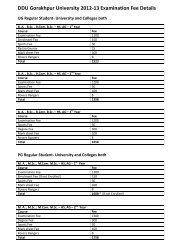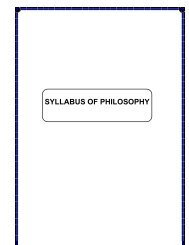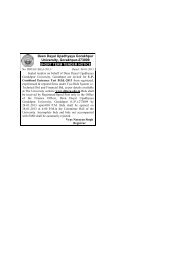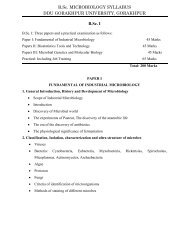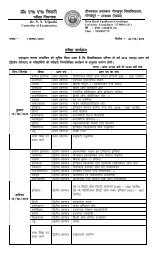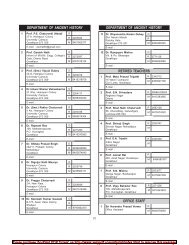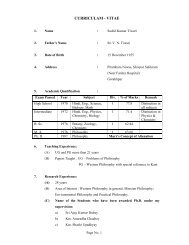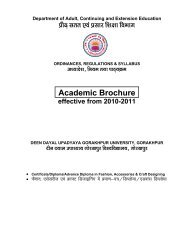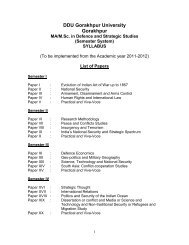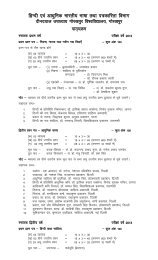PG Syllabus
PG Syllabus
PG Syllabus
You also want an ePaper? Increase the reach of your titles
YUMPU automatically turns print PDFs into web optimized ePapers that Google loves.
M. Sc. Final<br />
Paper II(C) : Thermodynamics and Intermolecular Forces<br />
Books :<br />
Axiomatic Approach<br />
Caratheodory’s principle. Thermodynamics in the presence of external fields : electrical field, magnetic<br />
field and gravitational field.<br />
Intermolecular forces :<br />
Dispersion, dipole, induction and Charge transfer forces. The hydrogen bond.<br />
Thermodynamics of mixtures :<br />
Excess thermodynamic functions. Activity coefficients : NRTL (Non Random Two Liquids Model) and<br />
UNQUAC (Universal Quasi Chemical Approach) Models. ASOG (Analytical Solvents of groups) and<br />
UNIFAC (Universal Functional Activity Coefficient) Methods.<br />
Solutions of macromolecules, Regular Solutions. Elementary ideas of lattice. Cell model and average<br />
potential model of liquid mixtures.<br />
Phase Equilibria :<br />
Thermodynamic relations at the –point. Thermodynamic interpretation of phase diagrams : eutectic<br />
systems, Systems exhibiting complete miscibility in solid and liquid phases. Mixtures having a<br />
congruent melting point, Systems having a partial miscibility in solid phases. Critical solution mixing.<br />
Liquid State :<br />
Radial distribution function. Configurational entropy and free energy. Cell theory of liquid state, Hole<br />
theory, Gas like and solid like, Molecular theory of liquid viscosity, Mesomorphism.<br />
Thermodynamics of Surfaces :<br />
Gibbs adsorption equation. Thin films. Thermodynamic theory of stability of equilibrium.<br />
Thermodynamics of Irreversible processes :<br />
Thermodynamic criteria for non-equilibrium states ; Entropy production and entropy flow in<br />
irreversible processes, Entropy balance equation for heat flow, relation between fluxes and forces.<br />
Non-equilibrium stationary states, Linear phenomenological equations, Onsager’s reciprocity relation.<br />
Curie Prigogine priniciple. Linear thermodynamic theory of thermosmosis. Electro kinetic phenomena<br />
and Reverse Osmosis. Far from equilibrium phenomena : Membrane Oscillations.<br />
1. Pitzer : Thermodynamics<br />
2. Guggenheim : Chemical Thermodynamics<br />
3. Mac Glashan : Chemical Thermodynamics<br />
4. Rowlinson : Liquids and liquid Mixtures<br />
5. Buckingham : Thermodynamics<br />
6. Haase : Irreversible Thermodynamics<br />
7. Prigogine : Molecular Theory of<br />
8. Eyring : Significant liquid Structures 9.Ion–Exchange Vol. I edited by J. A. Mannsky



